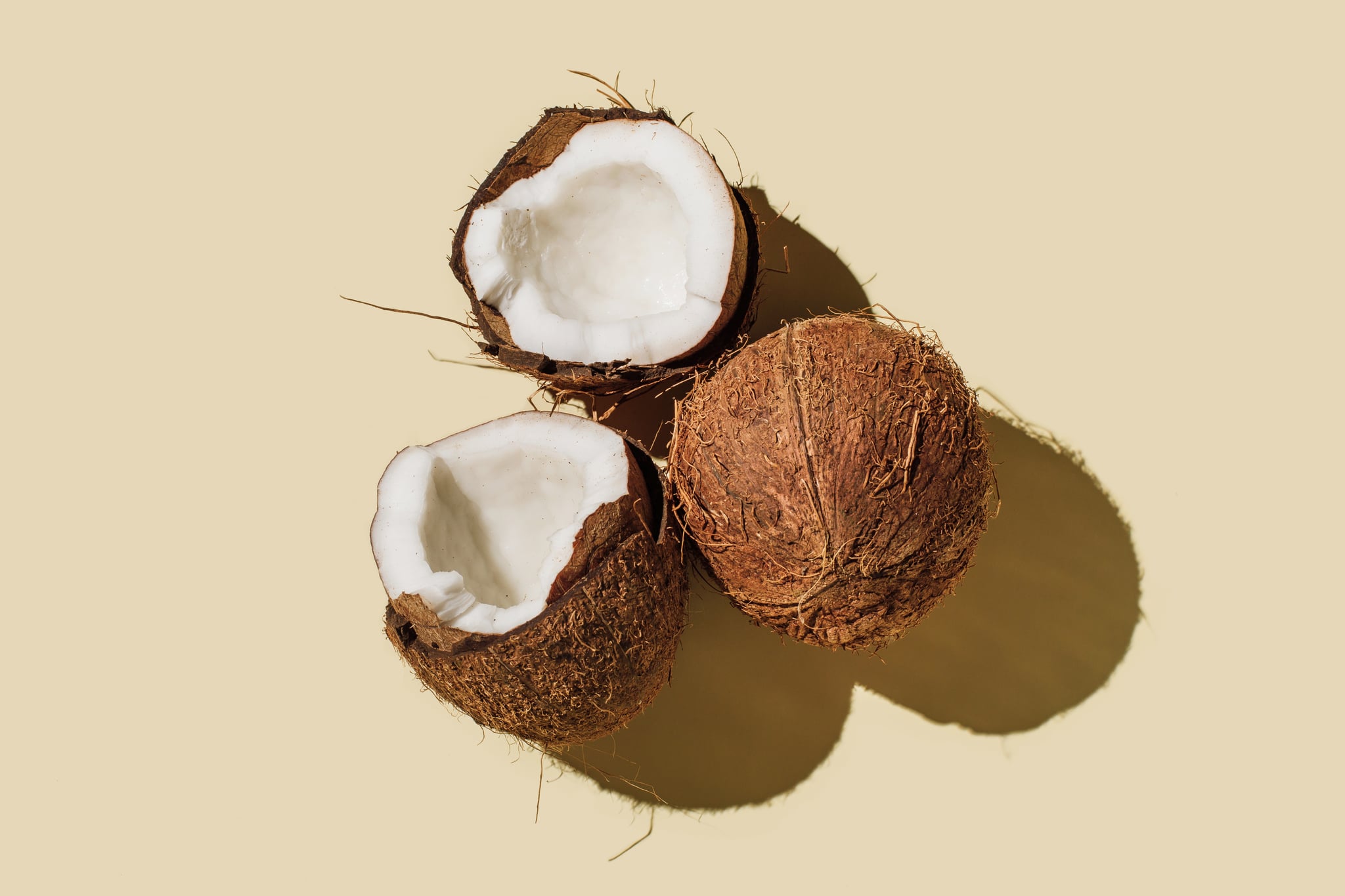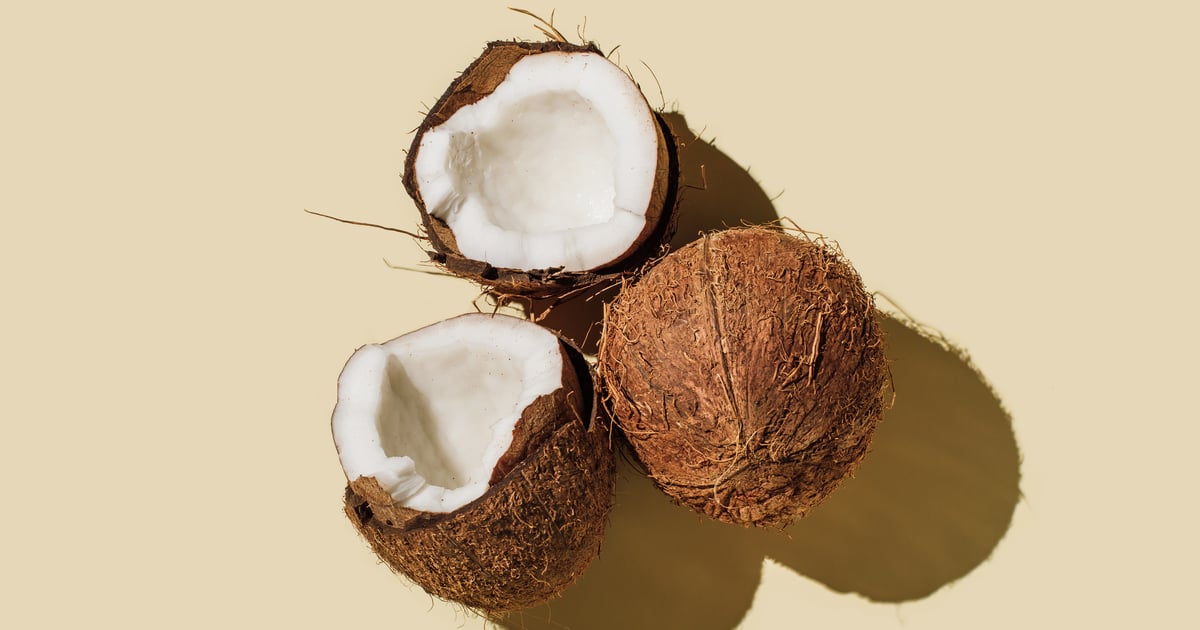
While many wellness fads come and go, some just, well, stick. Case in point: Coconut oil.
Following a steep, rocket-esque rise in popularity a few years ago, the so-called superfood has solidified a spot on grocery store shelves, in kitchen pantries, and in skin-care routines seemingly everywhere — and, depending on who you ask, that might be for good reason.
The fitness community raves about coconut oil’s fat-burning benefits; beauty gurus swear by its hair- and skin-nourishing properties; and celebrities claim it’s an oral hygiene miracle elixir. Nutrition experts, on the other hand, don’t seem to be as sold on the coo-coo-for-coconut-oil sentiment. After all, the oil’s made primarily of saturated fats, which has been deemed one of the most unhealthy fats by the American Heart Association (AHA). Plus, more research is still needed to confidently make claims about coconut oil’s perks, says Jordan Hill, RD, CSSD, lead registered dietitian at Top Nutrition Coaching.
That’s not to say, however, that you should stop using coconut oil to cook or blending it into your a.m. smoothies altogether. There’s a good chunk of research out there that suggests coconut oil may, in fact, support immune function, promote weight management, and more, Hill notes.
Ahead, learn all about the nutrition facts, health benefits and potential risks of coconut oil, according to pros and science.
Refined vs. Unrefined Coconut Oil
Coconut oil is made by first machine-pressing dry or fresh coconut meat to extract the oil, according to the Harvard T.H. Chan School of Public Health.
From there, the process typically goes one of two ways. The oil can undergo more processing — bleaching to remove impurities and heating or steaming to deodorize — to create the refined variety. Because of all the refining, this type of coconut oil has a neutral flavor and typically fewer nutrients, Hill explains. Or the oil can just be left as is, retaining the fruit’s flavor and aroma and boasting more nutrients than its processed counterpart — this kind is known as unrefined (or virgin) coconut oil.
Coconut Oil Nutrition Facts
Let’s get right to it and talk about the elephant in the room: the fat in coconut oil. By simply being an oil, coconut oil is 100-percent fat. Eighty to 90 percent of that, however, is saturated fat, which is what makes the ingredient solid at room temperature. It’s also what largely drives the debate over whether or not coconut oil is truly healthy; a diet high in saturated fat can drive up total cholesterol and increase your chances of heart disease and stroke, according to the AHA.
That said, the predominant type of saturated fat in coconut oil is lauric acid, “which is a medium-chain fatty acid that’s been researched for its health benefits,” says Rahaf Al Bochi, RDN, LD, registered dietitian nutritionist and founder of Olive Tree Nutrition. And while both types of coconut oil have similar amounts of calories and fats, per Hill, the virgin or unrefined variety stands out for having antioxidants and a few key micronutrients, such as vitamin E.
Here is a snapshot of the nutrition facts for 1 tbsp of virgin or unrefined coconut oil from Whole Foods, according to the United States Department of Agriculture (USDA). (FYI, these stats are the same for the brand’s refined variety as well.)
- Calories: 130
- Protein: 0 g
- Fat: 14 g
- Carbohydrate: 0 g
- Sodium: 0 g
Health Benefits of Coconut Oil
While both experts emphasize that more research is needed to prove coconut oil’s potential perks, they also note that there are a handful of benefits backed by ample scientific literature, such as the ones below.
Offers Antimicrobial Properties
ICYDK, fats — such as coconut oil — are made up of smaller molecules called fatty acids. Coconut oil, in particular, mostly contains lauric acid, a medium-chain fatty acid (which is a type of medium-chain triglyceride or MCT). Why is this important? Because lauric acid has been shown to have antimicrobial and antifungal properties, specifically against bacteria, such as E. coli and H. pylori, Al Bochi says. These disease-fighting effects can, in turn, support immune health and gut function, she adds.
May Provide Quick Energy
Medium-chain fatty acids are digested differently than long-chain fatty acids (such as omega-3 fatty acids) largely because of their difference in structure. “Medium-chain fatty acids go straight to the liver where they are used as instant energy,” Al Bochi says. Because of this, coconut oil can be a particularly beneficial source of energy for athletes or those who have trouble digesting other fats, she explains.
May Promote Weight Management
While no one thing can be responsible for losing or managing weight, there has been some research that suggests coconut oil may help you meet weight-related goals — and this result is largely thanks to the MCTs in the oil. “Small studies suggest that MCTs might increase feelings of fullness and potentially support weight management efforts,” Hill says. “This might be because they’re digested and absorbed more rapidly than long-chain triglycerides.” A 2014 study, for example, found that, compared to long-chain triglycerides, MCTs created a greater increase in the hormones peptide YY and leptin, which reduce appetite and boost feelings of fullness. Meanwhile, other studies suggest MCTs (such as those in coconut oil) may have the power to increase fat oxidation and “energy expenditure,” i.e. boost your body’s ability to burn fat and calories.
That being said, the studies on this potential benefit of coconut oil aren’t something to write home about. In general, they’re small, old, and/or, in Al Bochi’s words, “inconsistent.” In other words, more research in this area is very much required.
Support Oral Health
Although it’s been around for centuries, oil pulling — the act of swishing oil in your mouth — has recently taken off. That’s largely because when the ancient Ayurvedic practice involves coconut oil, it can offer the ingredient’s antimicrobial effects. More specifically, it can “reduce bad oral bacteria, which in turn can prevent and reverse gingival inflammation and prevent possible tooth decay,” Marina Gonchar, DMD and founder of Skin to Smile, previously told POPSUGAR.
Potential Risks of Coconut Oil
The main con of coconut oil? Its possible impact on your heart.
ICYMI above, coconut oil is primarily composed of saturated fats, “which can increase levels of LDL (‘bad’) cholesterol in some individuals,” Hill explains. “Diets high in saturated fats have been linked to an increased risk of heart disease and stroke.” So much so that in 2017, the AHA went as far as to “advise against the use of coconut oil” and in 2020 said the ingredient “may be viewed as one of the most deleterious cooking oils that increases risk for cardiovascular disease.” In general, the organization recommends limiting all saturated fat intake so that, in the case of those who are at risk for or have cardiovascular disease, it accounts for only 5-6 percent of your daily calories. If your heart is in good shape, you might want to heed the advice from the USDA’s 2020-2025 Dietary Guidelines for Americans and keep saturated fat to less than 10 percent of your daily calories.
So, Is Coconut Oil Good For You?
“Though coconut oil has gained popularity for its potential benefits, it is still a high-calorie, fat-rich food,” Hill says. “It can be incorporated into a varied, balanced, and moderate diet but the overall impact of coconut oil on health varies from person to person, depending on individual dietary needs, health status, and lifestyle factors.”
If you eat coconut oil regularly (or you want to) and are concerned about its impacts on your health, consulting with a dietitian or your doctor is always a good idea.
Image Source: Getty / Tanja Ivanova
